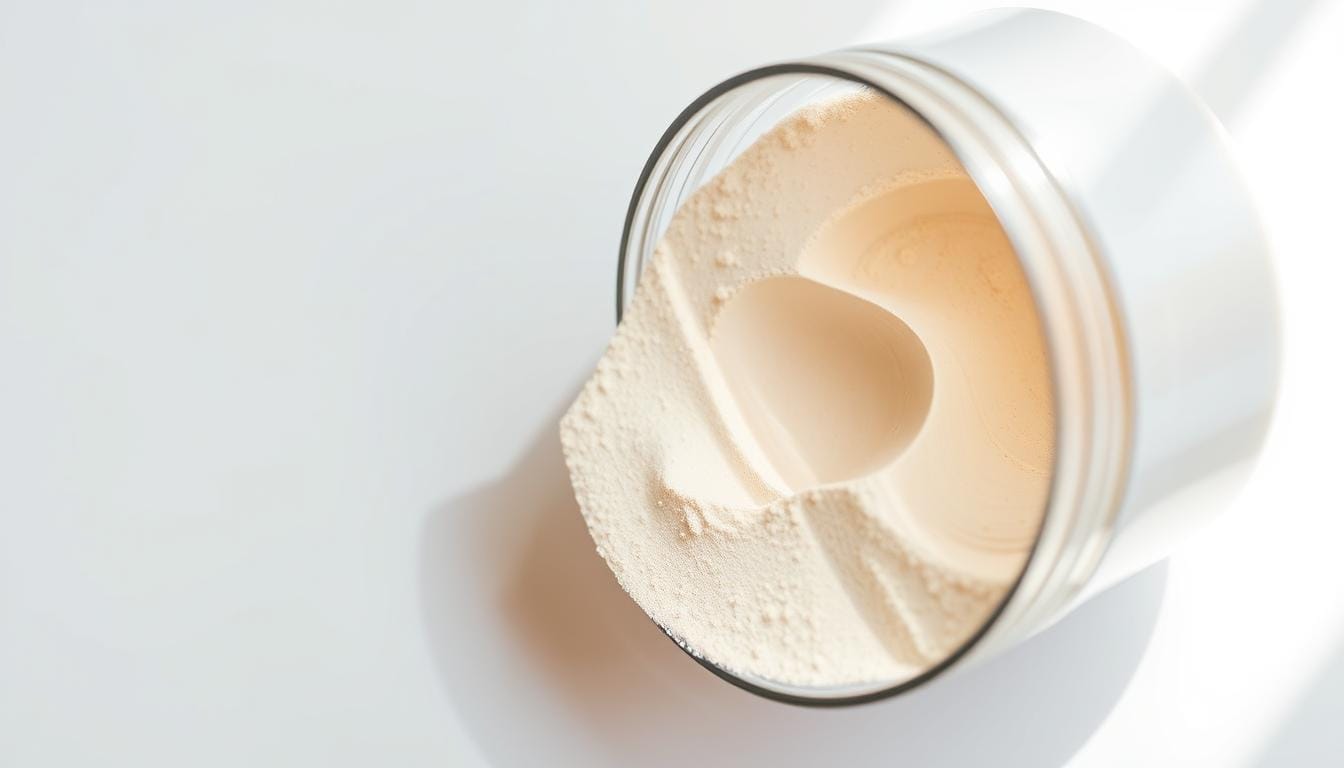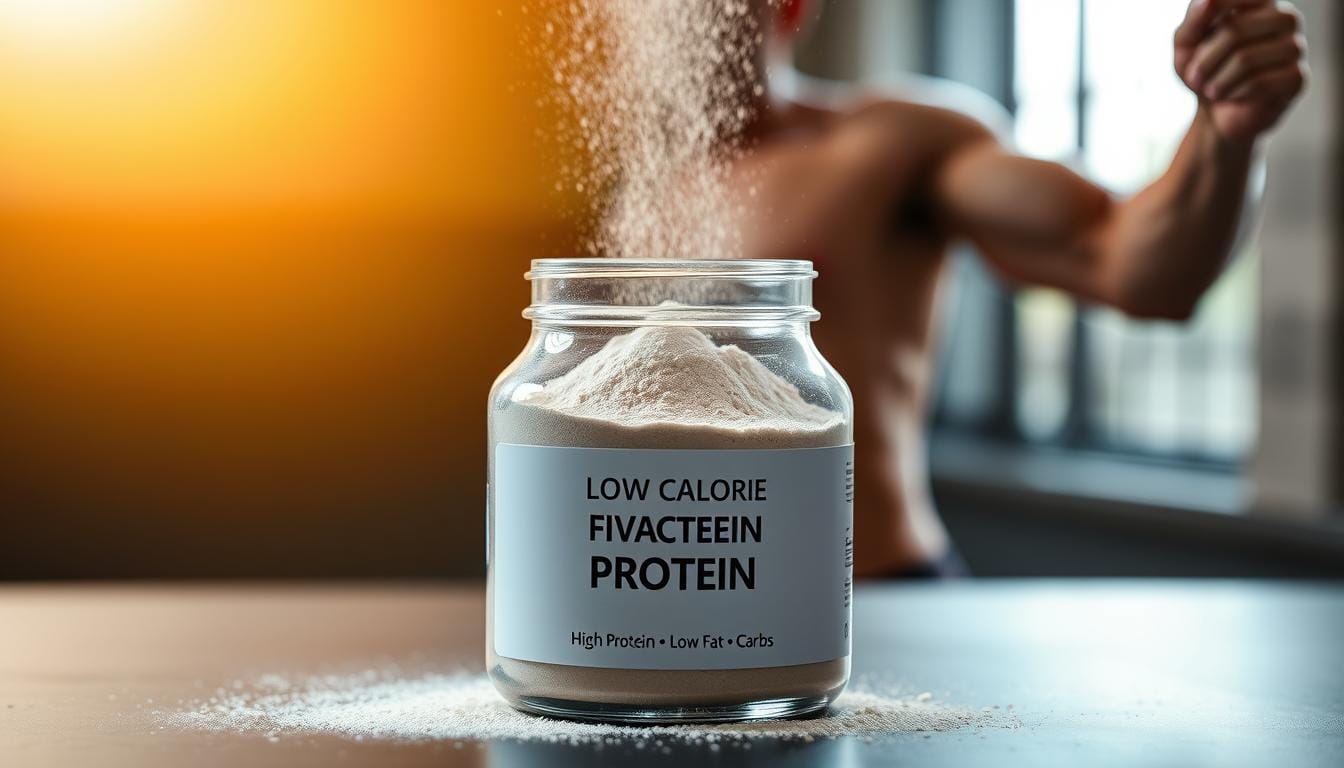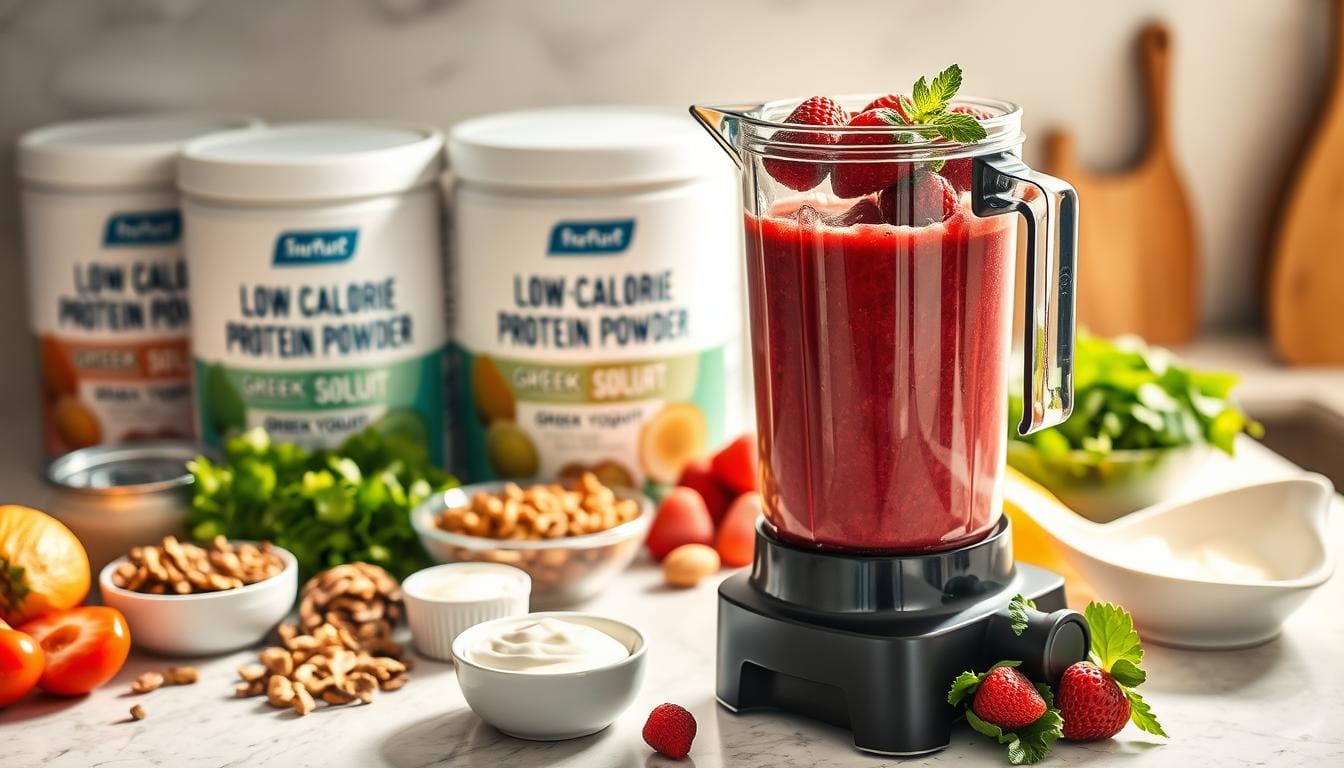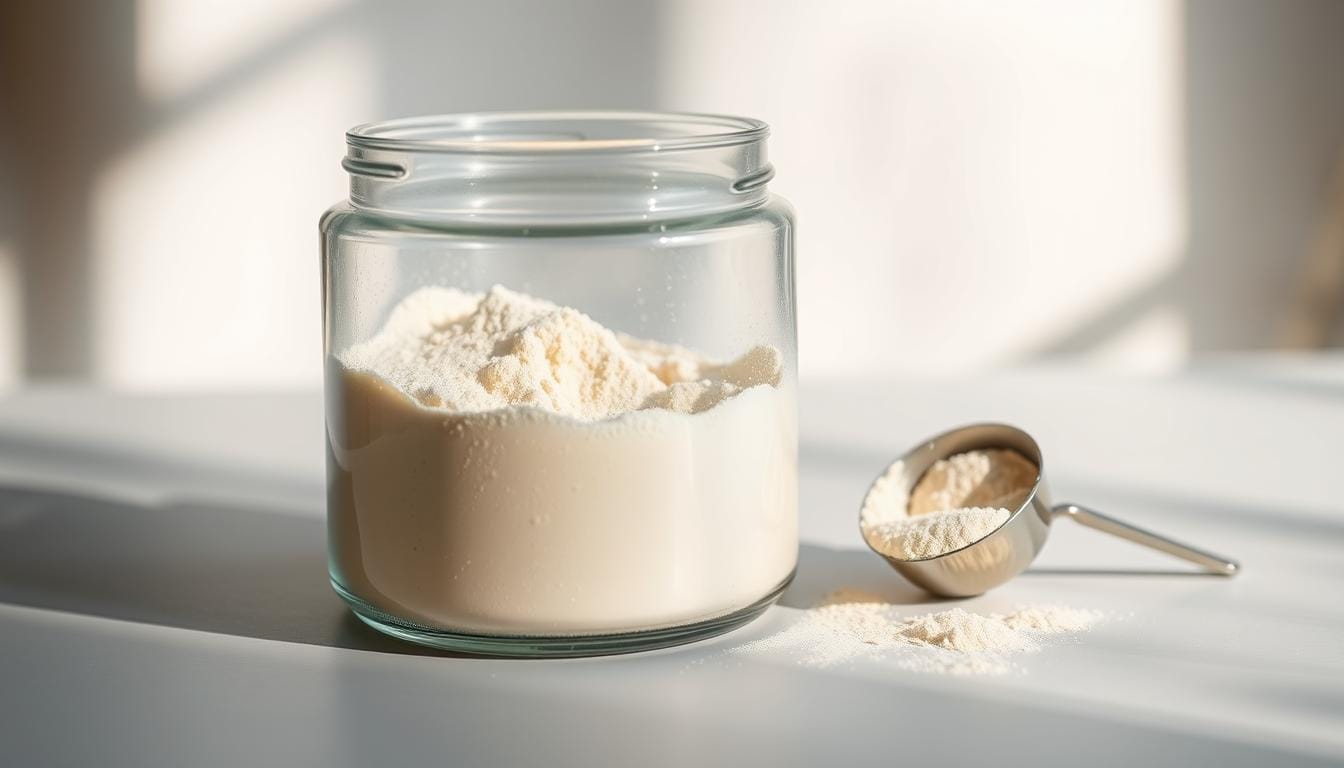
Every fitness journey has a secret weapon. For many, that weapon is a low calorie protein powder. It can change your nutrition without the need for complex diet plans or strict eating.
Protein powder is more than just a supplement. It’s a key tool for those serious about managing their weight and keeping muscles strong. The best low calorie protein powders offer important nutrients without adding too many calories. This makes them ideal for those who carefully track their food intake.
Protein powders give you 20-40 grams of protein per serving, with only 120-150 calories. This helps support muscle growth without ruining your diet. Brands like Transparent Labs Whey Isolate and Legion Whey+ create special formulas to boost your nutrition.
Whether you’re an athlete, a busy professional, or someone focused on wellness, a low calorie protein powder can be a game-changer. Your body needs smart, efficient fuel. These supplements provide just that.
Table of Contents
Understanding the Role of Protein in Weight Management
Protein is key in your weight loss journey. It helps manage body composition and metabolism. Knowing how protein works can change your nutrition approach.
Your body needs protein for many functions, not just building muscles. Studies show protein intake affects weight management in several ways:
- Increases satiety hormones like GLP-1 and peptide YY
- Reduces hunger hormone ghrelin
- Boosts metabolic rate through higher thermic effect
Essential Functions of Protein in the Body
Protein does more than build muscles. A low calorie whey protein powder supports important body functions while keeping calories low. Protein’s thermic effect is impressive – it burns 20-30% of calories during digestion, unlike carbs which burn 5-10%.
“Protein is the building block of life, and strategic consumption can be a game-changer for weight management.”
Protein’s Impact on Muscle Preservation
Keeping muscle mass during weight loss is vital. A low calorie protein powder helps keep lean muscle, which burns calories even when you’re not active. Research shows high protein diets prevent muscle loss and slow down metabolism during weight loss.
Daily Protein Requirements for Weight Loss
Your protein needs vary based on several factors. Experts suggest:
- 0.7 to 1 gram of protein per pound of lean body mass
- Approximately 30% of total calorie intake from protein
- 25-30 grams of protein per meal
By adding protein to your diet, you can help with weight loss. It also keeps muscle mass and keeps you full.
Benefits of Low Calorie Protein Powder

Exploring the perks of low calorie protein powder can change how you approach fitness and nutrition. These supplements make it easy to increase your protein without adding too many calories.
Low calorie protein powder does more than just provide nutrition. Here are some key benefits that make them a great choice:
- Supports muscle growth and recovery
- Aids in weight management
- Provides quick and easy protein supplementation
- Helps maintain lean muscle mass
An affordable low calorie protein powder can be a game-changer for your fitness goals. With 20-25 grams of protein per serving and only 97-120 calories, they’re ideal for those watching their calories.
Studies show protein supplements can greatly affect your body composition. A 2020 review in the Journal of Obesity & Metabolic Syndrome found that more protein can lead to weight loss and better body shape.
The key is selecting a high-quality, clean protein powder that meets your specific nutritional needs.
Nutrition experts say active adults need 1.2 to 2.2 grams of protein per kilogram of body weight. An affordable low calorie protein powder helps meet this need.
Whether you’re an athlete, fitness lover, or just want to keep your muscle mass, low calorie protein powder is a great choice. It fits well into your lifestyle.
Different Types of Low Calorie Protein Sources
When looking for the best low calorie protein powder, knowing your options is key. There are many protein sources, each with its own benefits for fitness and nutrition. Your search for the perfect protein supplement begins with exploring different types that fit your diet.
Choosing the right protein source is important for your nutrition plan. Let’s look at the most popular low calorie protein powder options:
Whey Protein Isolate: The Lean Muscle Builder
Whey protein isolate is a top choice for building lean muscle:
- It has 90% or more protein
- It usually has 97-120 calories per serving
- It absorbs quickly to help muscles recover
- It has little carbs and fat
Plant-Based Alternatives: Versatile Nutrition
If you’re looking for a low calorie plant based protein powder, there are many options:
- Pea Protein: About 120 calories per serving
- Chia Seed Protein: 5 grams of protein per ounce
- Edamame Protein: 18 grams of protein per cup
Egg White Protein: Clean and Pure
Egg white protein is another great low-calorie choice with about 110 calories per serving. It has all nine essential amino acids, making it perfect for those avoiding dairy or wanting a clean protein source.
Pro tip: Always check the protein powder’s total amino acid profile and verify it meets your specific nutritional requirements.
Selecting Quality Low Calorie Protein Powder
Choosing the right low calorie protein powder is important. It affects your nutrition, taste, and fitness goals. Look for key factors in reviews to find a quality and effective powder.
Here are the critical elements to consider:
- Protein content per serving
- Calorie count
- Ingredient transparency
- Third-party testing
- Dietary compatibility
When looking to buy low calorie protein powder, check out different places. Online stores like Amazon and nutrition websites have a wide range. Local health stores and supplement shops also offer great options for quick purchase.
| Protein Powder | Protein/Serving | Calories | Price Range |
|---|---|---|---|
| Naked Whey | 25g | 120 | $$ |
| Podium Nutrition | 27g | 120 | $$ |
| Ritual Essential Protein | 20g | 100 | $ |
Pro tip: Always read ingredient labels and check for minimal additives. Prioritize powders with natural ingredients and transparent nutrition profiles.
Your ideal protein powder should match your health goals, diet, and taste. Spend time researching and trying different options. This will help you find the perfect fit for your fitness journey.
Natural vs Artificial Sweeteners in Protein Powders
When picking a low calorie protein powder, it’s key to know about the sweeteners. Not all sweeteners are the same. Your choice can affect taste and health.
Companies use different ways to sweeten their protein powders. Look for a product that balances taste, nutrition, and health.
Common Sweetener Types
- Natural Sweeteners
- Stevia (zero glycemic index)
- Monk fruit extract (zero calories)
- Organic coconut sugar
- Artificial Sweeteners
- Sucralose
- Aspartame
- Acesulfame potassium (Ace-K)
Impact on Taste and Calories
Sweeteners change how protein powders taste and their calorie count. Natural sweeteners like stevia add sweetness without calories. Artificial sweeteners can make things taste good with almost no calories.
| Sweetener Type | Sweetness Intensity | Calories | Health Consideration |
|---|---|---|---|
| Stevia | Medium | 0 | Safe for diabetics |
| Monk Fruit | High | 0 | No insulin impact |
| Sucralose | Very High | 0 | Potential gut microbiome disruption |
Health Considerations
The World Health Organization talks about health risks from artificial sweeteners. Pick protein powders with natural sweeteners for better health.
Choose protein powders with clear sweetener info for better nutrition choices.
Natural sweeteners like stevia and monk fruit are safer than artificial ones. They might lower the risk of health problems linked to artificial additives.
Incorporating Protein Powder into Your Diet

Adding low calorie protein powder to your diet is easy. It lets you increase your protein without adding too many calories. This is great for those trying to lose weight.
Here are some fun ways to add low calorie protein powder to your meals:
- Morning Smoothies: Blend 1-2 scoops of protein powder with spinach, a frozen banana, and milk for a nutrient-packed breakfast
- Overnight Oats: Mix protein powder with rolled oats, chia seeds, and berries for a filling morning meal
- Baking Enhancements: Add protein powder to waffle or pancake batter to increase protein content
- Coffee Boost: Stir protein powder into your morning coffee for an added protein kick
Being consistent and creative is key to using low calorie protein powder for weight loss. Most protein powders have 15-20 grams of protein per serving. This helps you get enough protein without too many calories.
Pro tip: Try to eat about 0.4 to 0.55 grams of protein for every kilogram of your body weight per meal. For someone who weighs 150 pounds, that’s about 27-38 grams of protein.
Common Ingredients to Avoid in Protein Supplements
When looking for a low calorie whey protein powder, it’s key to know about harmful ingredients. Not all protein supplements are the same. Some have ingredients that can harm your health and fitness goals.
Hidden Sugars and Fillers
Many affordable low calorie protein powders have hidden ingredients that can harm your health:
- Maltodextrin: Causes rapid blood sugar spikes
- High fructose corn syrup: Linked to heart problems
- Sunflower lecithin: May interfere with nutrient absorption
Artificial Additives
Artificial sweeteners and additives can be harmful:
- Aspartame: Associated with neurological issues
- Sucralose: Can disrupt gut microbiome
- MSG: May trigger allergies
Controversial Ingredients
Some protein powder ingredients are a big health concern:
- Soy protein isolate: Contains phytoestrogens
- Trans fats: Increase bad cholesterol levels
- Hydrogenated oils: Linked to inflammation and obesity
Always check the ingredient labels when picking your protein supplement. Choose natural, minimally processed options that help your fitness and health goals.
Maximizing Results with Proper Timing and Dosage

To get the most out of low calorie protein powder, timing and dosage are key. How you use protein supplements can really help you reach your fitness and weight loss goals.
Knowing when to take low calorie protein powder is important. Studies show that timing can help with muscle recovery and weight control:
- Morning intake boosts metabolism and curbs cravings
- Post-workout consumption supports muscle recovery
- Pre-bed protein can aid muscle synthesis during sleep
The right amount of protein depends on how active you are:
- Sedentary individuals: 0.8 grams per kilogram of body weight
- Light activity: 1.0 grams per kilogram
- Moderate activity: 1.2-1.5 grams per kilogram
- Heavy activity/Athletes: 1.6-2.0 grams per kilogram
For weight loss, aim for 20-30 grams of protein after working out. Whey protein isolate is great because it’s high in protein and low in lactose. It’s perfect for building lean muscle.
Pro tip: Consume your protein within 30 minutes after exercise for optimal muscle recovery and metabolic benefits.
Keep in mind, everyone’s needs are different. Check your protein intake regularly to match your fitness and weight loss goals. Talking to a nutritionist can help you tailor your low calorie protein powder use for the best results.
Top Brands of Low Calorie Protein Powder
Finding the right low calorie protein powder can be tough. There are so many choices out there. We’ve looked at the top brands to guide you in picking the best one for your fitness goals.
Several brands stand out when it comes to low calorie protein powder. They are known for their quality and how well they work:
- Transparent Labs: Known for clean ingredients and minimal additives
- Nutricost: Offers budget-friendly low-calorie options
- Cellucor: Popular among fitness enthusiasts
- Legion: Focuses on science-backed formulations
Here’s a closer look at what makes these brands great:
| Brand | Calories per Serving | Protein Content | Key Features |
|---|---|---|---|
| Transparent Labs | 97.5 | 24g | Grass-fed whey, no artificial sweeteners |
| Naked Whey | 120 | 25g | Minimal ingredients, pure protein |
| Egg White Protein | 110 | 22g | Lactose-free, alternative protein source |
When picking your low calorie protein powder, think about these things:
- Total calorie content
- Protein per serving
- Additional ingredients
- Taste and mixability
Pro tip: Always check the nutrition label and opt for powders with minimal additives and artificial sweeteners.
Common Myths and Misconceptions About Protein Powders
Protein powders, like low calorie options, often face misconceptions. These can confuse people who want to stay fit. Let’s clear up some common myths about these supplements.
“Not all protein powders are created equal” – Nutrition Expert
Many think low calorie whey protein is only for bodybuilders. But, protein supplements help people of all fitness levels and goals. The amount of protein you need depends on your body weight and health.
- Myth: Protein powders are unhealthy
- Fact: Quality protein powders can support muscle recovery and weight management
- Myth: All protein powders taste terrible
- Fact: Modern formulations offer delicious flavor options
Another big myth is that protein powders are full of sugar and calories. Scientific research demonstrates that many low calorie protein powders are nutritious without too many calories. A 2017 study found whey protein helps overweight people lose weight and body fat.
| Myth | Reality |
|---|---|
| Protein powders cause kidney damage | Studies show protein intakes up to 4-5 times RDA are well-tolerated |
| Only athletes need protein supplements | Protein supports muscle maintenance for all age groups |
Knowing the truth about protein supplements helps you choose wisely. When picking a low calorie whey protein powder, focus on quality and what you need personally.
Conclusion
Using low calorie protein powder can change your fitness journey. These supplements help with weight management by providing quality protein without many calories. You can find products with 90 to 160 kcal per serving, fitting your nutritional needs.
These powders do more than just provide nutrition. They can boost your metabolism, help keep muscle, and control hunger. Studies show they help keep lean muscle while cutting calories, aiding in weight loss and fitness.
Success comes from choosing wisely and using these powders smartly. Look for ones with little sugar, focus on quality, and add them to your diet plan. Use them in smoothies, as meal replacements, or after workouts. They can be a big help in your health and fitness journey.
Choosing the right protein powder is key to reaching your fitness goals. Pick high-quality, low calorie options that match your fitness dreams.
